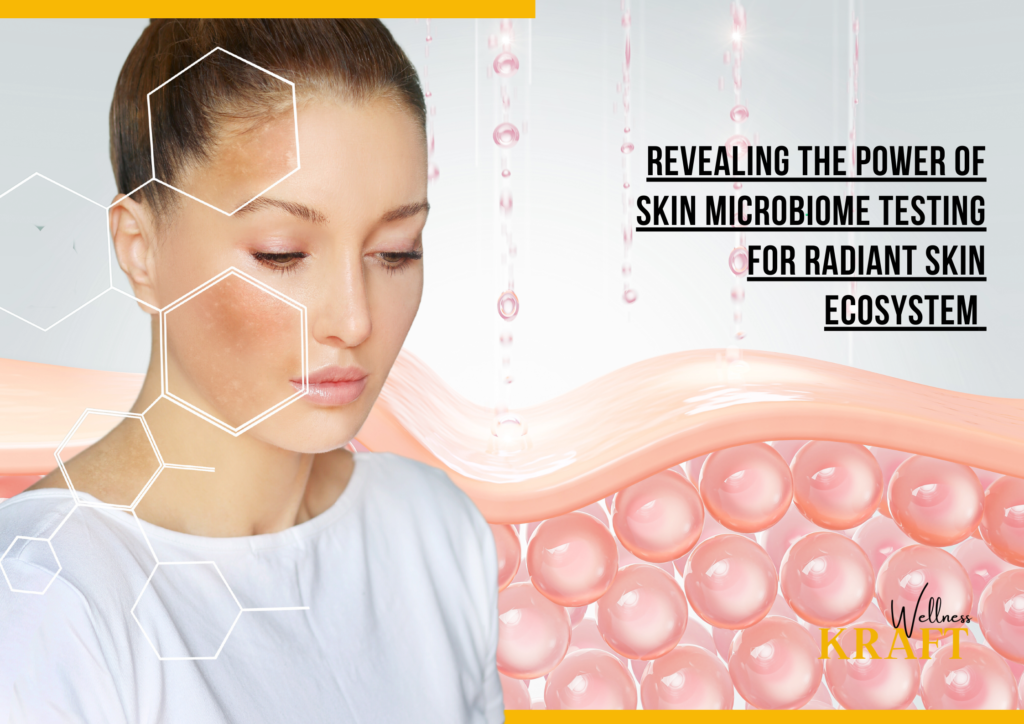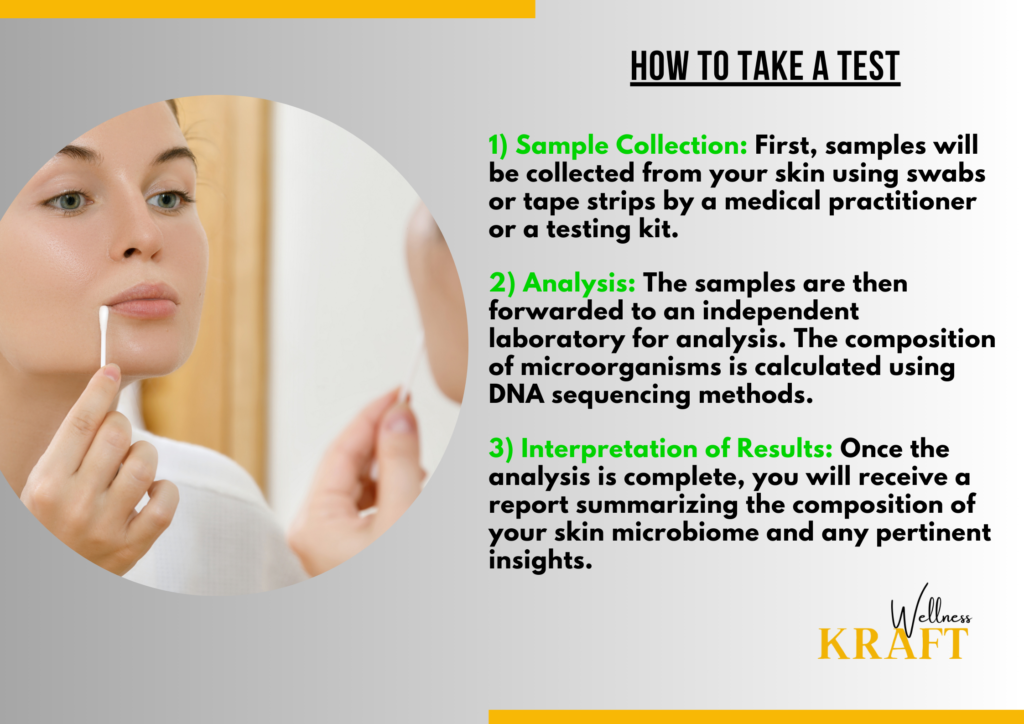Microbiome analysis provides an in-depth look at the ecosystem of your skin – Wellness Kraft

Table of Contents
Introduction
The outermost layer of our bodies, the skin, is home to a diverse community of organisms and is much more than a simple barrier. The skin microbiome refers to the diverse community of microorganisms that live on human skin and play an important role in skin maintenance. Cutting-edge technology for testing the skin microbiome now permits us to probe this mysterious underworld. Here, we’ll take a deep dive into the world of skin microbiome testing, exploring its inner workings, benefits, pitfalls, research analysis, and commonly asked questions.
The Microbiome at a Glance
To realize the significance of skin microbiome testing, it’s vital to understand the skin microbiome itself. Bacteria, viruses, fungus, and other microorganisms form an intricate community on the skin’s surface. Together, they create a complicated and nuanced balance that is necessary for the health and functions of the skin, such as immune function, managing inflammation, and defense against harmful microorganisms.
What is Skin Microbiome Testing ?
Skin microbiome testing is a cutting-edge technique that allows us to assess the composition and diversity of microorganisms dwelling on the skin. Researchers and skin care experts can identify and quantify the various microorganisms present by taking samples from the skin’s surface, frequently using swabs or tape strips.
In most cases, the genetic material of the microorganisms is collected and analyzed by means of DNA sequencing, which provides a basis for the analysis. This information offers insights into the types, numbers, and potential imbalances of microorganisms in the skin’s microbiome.
Benefits of Skin Microbiome Testing
1. Personalized Skincare:
Knowing your skin’s microbiome enables the development of customized skin care regimens for each individual. You can get greater results if you select products that are specifically formulated for your skin type.
2. Management of Skin Conditions:
Microbiome testing can identify specific imbalances in the skin’s ecology for individuals who suffer from skin conditions like acne, eczema, or psoriasis. With this information, better care can be provided.
3. Product Selection:
You can choose the best skin care products based on the insights gained from microbiome testing. You’ll be aware of which compounds are safe for your skin and which could upset your microbiome.
4. Acne and Eczema Prevention:
For people prone to acne and eczema, microbiome testing can reveal early warning signals, allowing for preventive actions to prevent flare-ups.
5. Optimized Healing:
Microbiome testing can aid in predicting and enhancing the skin’s natural healing process after surgery or damage.
6. Research and Innovation:
Rapid advancements in skin microbiome research are leading to the creation of ground-breaking skincare products and treatments.
Drawbacks of Skin Microbiome Testing
Despite its immense potential, skin microbiome testing has some drawbacks.
1. Cost:
Some individuals may not be able to afford testing due to its high price.
2. Limited Research:
There is still a lot to learn in the field of skin microbiome research, which is still developing. This means that the results may be difficult to understand.
3. Skin Variability:
The skin microbiome can differ greatly from one person to the next and even from one part of the body to the next, making generalizations difficult.
4. Limited Regulation:
Currently, there are limited standards in place to standardize microbiome testing processes, leading to inconsistency in the quality of services given.
How to Take a Test

The following are the standard procedures for testing the microbiome of the skin:
- Sample Collection: First, samples will be collected from your skin using swabs or tape strips by a medical practitioner or a testing kit.
- Analysis: The samples are then forwarded to an independent laboratory for analysis. The composition of microorganisms is calculated using DNA sequencing methods.
- Interpretation of Results: Once the analysis is complete, you will receive a report summarizing the composition of your skin microbiome and any pertinent insights.
Research Analysis
Recent Developments in the Study of the Microbiome
There is a constant influx of new information into the field of microbiome research. Acne, eczema, and even skin aging are just a few of the skin conditions that researchers are looking at the role of the skin microbiome in. If these relationships are realized, new therapies may be developed.
The benefits of skin microbiome testing in real-world scenarios are highlighted. In certain situations, individuals have successfully controlled skin conditions or enhanced their skincare routines based on microbiome analysis.
The Future of Skin Microbiome Test
Skin microbiome research is expected to advance positively in the future. As our understanding of the microbiome develops, we may anticipate increasingly sophisticated and accessible testing techniques as well as cutting-edge skin care products that are specifically suited to each person’s microbiome.
FAQs
1) What is the skin microbiome, and why is it important for my skin?
The term “skin microbiome” is used to describe the wide variety of microorganisms found on the epidermis. Essential for skin homeostasis, inflammation control, and pathogen defense.
2) How does skin microbiome testing work?
Insights into the composition and diversity of the skin microbiome are provided by skin microbiome testing, which entails taking samples from the skin and examining the microorganisms’ genetic information.
3) What are the benefits of understanding my skin’s microbiome?
Understanding your skin’s microbiome enables tailored skin care, improved management of skin conditions, wise product selection, and proactive prevention.
4) Are there any potential risks associated with skin microbiome testing?
Due to the fluid nature of microbiome research, the greatest threat is the associated cost and the difficulty in interpreting results.
5) Can skin microbiome testing help with skin conditions like acne and eczema?
Yes, testing can help direct therapy and care plans for many conditions by revealing imbalances in the microbiome.
6) Is skin microbiome testing suitable for all skin types and tones?
Individuals of all skin types and tones can benefit from microbiome testing.
7) Are the results of microbiome testing easy to interpret and act upon?
Since research is constantly developing, interpretation can be difficult; nevertheless, medical experts can help.
8) How can I get my skin microbiome tested, and is it affordable?
You can get tested through healthcare professionals or testing kits, but cost can be a barrier.
9) Can microbiome testing be done at home, or do I need to visit a clinic?
There are both at-home testing kits and clinic-based diagnostics available.
10) What is the future potential of microbiome research for skincare and dermatology?
More sophisticated testing techniques, cutting-edge skin care products, and a deeper understanding of the role of the microbiome in skin health are all in store for the future.
Concluding Thoughts
The advent of skin microbiome testing heralds a brand-new era in the skincare industry. You can optimize your skincare regimen, treat skin conditions, and stay on the cutting edge of skin health by receiving insights on the microbiome that lives on the surface of your skin. The potential benefits are unquestionable, notwithstanding the hurdles and the current research. We may anticipate even more individualized and efficient skin care solutions that are catered to your specific skin ecology as the field of microbiome research continues to grow. Therefore, don’t waste this chance to improve your appearance by ignoring the microbiome of your skin.







